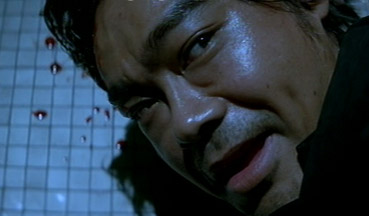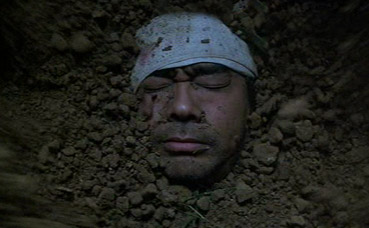"Apply emotions to investigate! Not logic!" |
Detective Bun to protégé Ho |
It's hard to imagine that any devotee of offbeat cinema would not be instantly hooked by the opening few minutes of Mad Detective [Sun taam], the new film from prolific Hong Kong crime thriller director Johnny To and frequent collaborator Wai Ka-Fai. As young Inspector Ho Ka On (Andy On) arrives at his new precinct, he is shushed into silence by one of a group of officers who have gathered to watch fellow inspector Chan Kwai Bun (Lau Ching Wan), as he circles a hanging pig's carcass and violently assaults it with a fearsome knife. A short while later Ho is the only one on hand when Bun frantically grabs a large suitcase, climbs inside it and orders the younger detective to push him down the stairs. Ho unquestionably obliges, repeating the action until they reach the ground floor. Dazed and bruised, Bun emerges from the suitcase and proclaims "The killer is the ice cream shop owner!" Cue a newspaper headline informing us that Bun has solved another murder mystery. Just a short while later, this brilliant but unorthodox detective's career comes to an abrupt end when he cuts off his own ear and offers it as a present to his retiring chief. Interested? No? Then leave the room immediately. If this does whet your appetite, however, then prepare yourself for more, as Mad Detective has no problems whatsoever living up to the promise of its title.

A location switch and we're in the company of detectives Wong and Chi-Wai on a night-time stake-out. Their relationship is quickly established by the argument that erupts after Chi-Wai steals money from Wong's dropped wallet, but the accusations are interrupted when the man they are waiting for shows and runs and they are forced give chase. Wong slips and falls and Chi-Wai loses his prey in a tussle, only to confront him again a short while later when they pull guns on each other. Instead of opening fire, Chi-Wai allows the man to flee. Wong, we later discover, is nowhere to be found.
Jump forward 18 months and the investigation into Wong's disappearance is still active and being handled by Ho, but his lines of enquiry have all run dry. He's left with one last hope of solving the case, an approach that prompts only contempt and derision from his fellow officers – he decides to call on Bun for help. Fired from the force following the ear-slicing incident, Bun still has a burning sense of right and wrong and is still half-bonkers. But he retains a unique ability to see a person's inner personality, the true character that lies beneath the image of themselves that they present to others. The case arouses Bun's interest but brings him into conflict with his wife, as he long ago promised her that he's finished with police work. She's convinced that this case will somehow kill him, to which he responds tellingly, "I'd rather die than live miserably."
If you're detecting shades of Manhunter in this set-up then rest assured, in terms of its character and handling this is a very different movie. The directors repeatedly align us with Bun's view of the world and those he encounters within it, moving in the flash of an edit between their public persona and the personalities that lie beneath. At first this proves genuinely disorientating – did Bun just head-butt a female cop or an older detective's feminine inner self? – and reaches an early what-the-fuck? peak when Bun is following Chi-Wai, whose appearance and even gender switches from shot to shot and whose multiple personalities are visualised as a seven-person gang. At one point, this insight becomes a two-way process, when after taking a beating from Chi-Wai, Bun directly addresses the female element of the man's personality, stopping all seven in their tracks and prompting the remark "he can see us!"

Bun is not just the title character, he's the key reason the film is able to exert such an unbroken hold. Always unpredictable, often borderline explosive, there really is method in his apparent madness, the sort that prompts a smile of realisation when you work out what he's up to. As he darts from location to location, holding people up with his pointed finger and visualising their deaths at his hands, he initially leaves both Ho and the audience convinced of his insanity, but it soon becomes clear that he is retracing the steps of a killer, whose absent mindset and personality he is attempting to connect with. It's this combination of character unpredictability and subjective viewpoint filmmaking that delivers some of the film's neatest scenes and one of its best surprises, which is all the more effective when a re-watch reveals that there was no hint of a cheat used to deliver it.
Convention is still followed, particularly in the later development and resolution of the investigation, but even here the offbeat tends to win out over the familiar. Clues are uncovered but often by oddball means, while Ho's desire to learn from Bun leads to him electing to be buried in his colleague's place in order to tune himself to the victim's experience, an action that results only in his near suffocation and leaves Bun free to converse with the dead man's spirit. As Bun reminds the younger detective before shovelling dirt on him, "It's not easy being me."
Police crime stories of recent years in have too often had their identity shaped by the action movie, but it's procedural detail and an emphasis on character that have shaped the genre's most notable works of late. Mad Detective may may lack the dense detail and atmosphere of Zodiac and the pitch-perfect structure and handling of the standard-setting Memories of Murder, but is still a most welcome and entertaining deviation from the norm. Smartly made and intermittently very inventive, had the case at its centre been even half as complex as the character investigating it, it's a safe bet that the film would be destined for major cult status.
|